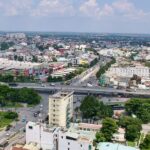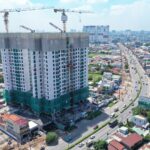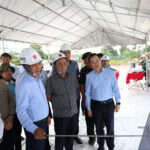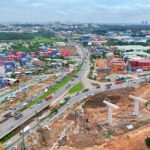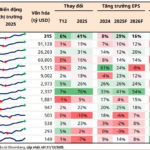On August 8, Dai Quang Minh Real Estate Investment Joint Stock Company sent a written request to the People’s Committee of Dong Nai province to consider and approve the company’s proposal to develop a road construction project. The road will connect Dong Xoai to Ho Chi Minh City’s Ring Road 4, passing through Dong Nai provincial road 753, Ma Da Bridge, and a connecting road from Ma Da Bridge to Ho Chi Minh City’s Ring Road 4.
The company has conducted research and surveys for the project’s implementation. If constructed, the road will shorten the travel distance from Dong Xoai to the old Bien Hoa city by approximately 13 kilometers compared to the current route, reducing travel time to just 1 to 1.5 hours.
The project is designed as a Grade III plain road with a maximum speed of 80 km/h. In the completion phase, the road will have a width of 34.5 meters, comprising 8 lanes; phase 1 is expected to have 4 lanes with a width of 20.5 meters. The preliminary total investment for phase 1 is over VND 22.6 trillion.
Dai Quang Minh plans to divide the project into three components. Component 1.1 involves the construction of an elevated road approximately 13 kilometers long, passing through the Dong Nai Nature-Culture Reserve, with the starting point connecting to Ma Da Bridge and the endpoint intersecting Dong Nai provincial road 761 in Tri An commune.
Component 1.2 entails building a 31.5-kilometer road from the elevated road to Ho Chi Minh City’s Ring Road 4, with the starting point connecting to Component 1.1 and the endpoint at the intersection of Ring Road 4.
For Component 1.3, the company proposes to upgrade and expand Dong Nai provincial road 753, with a length of about 16.7 kilometers. The starting point will be at the intersection with Dong Phu – Binh Duong Road in Tan Loi commune, and the endpoint will connect to Ma Da Bridge.
Dai Quang Minh suggests investing in Component 1.1 through a public-private partnership (PPP) model, while the remaining components and compensation and resettlement efforts will be funded by the state budget.
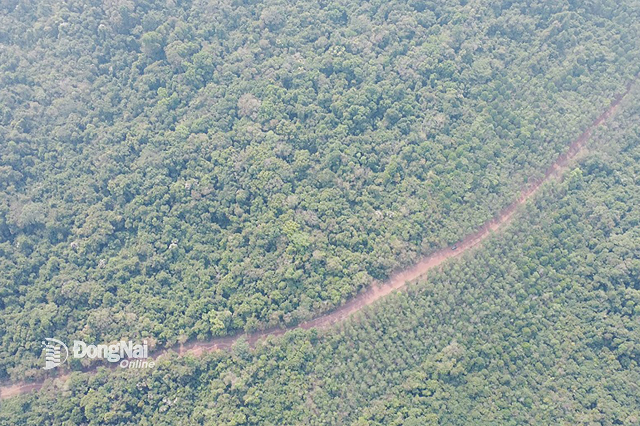
An elevated section of the project, spanning about 13 kilometers through the Dong Nai Nature-Culture Reserve. Source: Baodongnai.com.vn
|
Dai Quang Minh Real Estate Investment Joint Stock Company has a charter capital of VND 4,850 billion and operates in five key areas: investment development of residential real estate, commercial services, industrial parks, transportation infrastructure, and social utilities, as well as tourism and accommodation services.
The company is currently investing in key transportation infrastructure projects in the new urban area of Thu Thiem, including the project for four main roads in the new urban area of Thu Thiem, the central square and riverside park, Thu Thiem 2 Bridge (Ba Son Bridge), the pedestrian bridge, and the Southern Delta project (Eco-Park).
Previously, on April 24, the Government issued Resolution 91/2025/ND-CP, regulating the time point for determining land prices for land funds used to pay for build-transfer (BT) projects in the new urban area of Thu Thiem, Ho Chi Minh City, as concluded by the Government Inspectorate on June 26, 2019.
Out of the three projects covered by the Resolution, two are developed by Dai Quang Minh: the four main roads in Thu Thiem and Thu Thiem 2 Bridge.
The four main roads in Thu Thiem project has a total length of 11.9 kilometers, featuring 8 bridges and 2 flyovers. The R1 arc road (now Tran Bach Dang Street) is 3.4 kilometers long, the R2 lakefront road (To Huu Street) is 3 kilometers, the R3 Saigon River road (Nguyen Thien Thanh Street) is 3 kilometers, and the R4 Southern Delta road (Bui Thien Ngo Street) is 2.5 kilometers. The approved total investment for this project is nearly VND 12.2 trillion.
The Ba Son Bridge project has a length of 1,465 meters, with the bridge spanning 885.7 meters and comprising 6 lanes. The starting point of the bridge is at the intersection of Ton Duc Thang and Le Duan streets in District 1, connecting to the R1 route towards Thu Duc City. The approved total investment for this project is nearly VND 4.3 trillion.
Government resolves land fund payment issue for CII and Dai Quang Minh’s BT projects in Thu Thiem
– 13:12 11/08/2025
“A Streak of Good News for Infrastructure: Unraveling the Developments Along National Highway 13”
The supply of eligible apartments for sale in the price range of 50-55 million VND per square meter along National Highway 13 (northeast of Ho Chi Minh City) is dwindling. This trend indicates that the upward pressure on property prices in this area is unlikely to abate anytime soon, given the significant investments being made in improving the transportation infrastructure.
The Reason for the Delay in the Ho Chi Minh Road Project in An Giang – Ca Mau
The Ho Chi Minh Road project, spanning An Giang to Ca Mau, has faced some setbacks since its commencement in March 2024. As of now, only 42% of the construction has been completed, primarily due to shortages in filling materials and delays in land clearance. With these challenges, the project is at risk of falling behind schedule, making it unlikely to meet its target completion date this year.
A Closer Look at Hanoi’s Most Complex Interchange Project
The Tan Van Interchange, the most complex component of Ho Chi Minh City’s Ring Road 3, is currently under fast-paced construction. This vital transport link will serve as a critical connection point between Ho Chi Minh City and Dong Nai, facilitating smoother travel and trade between these important regions.


